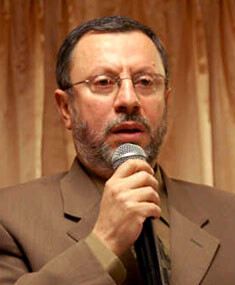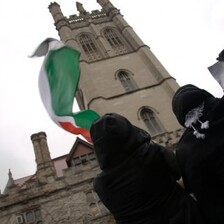The Electronic Intifada 13 January 2008

Dr. Abdelhaleem Ashqar (Sh. Kifah Mustapha)
Dr. Ashqar, who received his PhD from the University of Mississippi and was a candidate for the presidency of the Palestinian Authority in 2005, was convicted of one count of obstruction of the administration of justice and one count of criminal contempt stemming from his refusal to collaborate with federal grand juries, one in New York and one in Chicago, investigating Hamas and the Palestinian anti-occupation movement. His refusals to testify before investigative grand juries about his work and relationships with other Palestinians — in effect to become an informer against his people and his liberation movement — was part of a long history of resistance by activists in this country to “naming names” of political associates before government investigative bodies. Such refusals to cooperate with grand juries have occurred in response to the usurpation by prosecutors of the purported independent power of the grand jury.
The requirement that one must be indicted by a grand jury before being made to stand trial for a criminal felony offense, adopted from the English common law and enshrined in the Fifth Amendment of the US Constitution, was supposed to act as a safeguard to the accused from over-zealous or politically-motivated government prosecutors. In practice, however, the grand jury has never operated as a check on government overreaching and oppression either in England (which abandoned the use of grand juries in the 1930s) or in the United States. In reality, the history of the grand jury in both countries has been predominantly one of serving the interest of the government or the prejudices and passions of the local populace, and in the very few well publicized cases where individual grand juries have refused to indict political opponents of the government, government authorities have convened more compliant grand juries to obtain the desired charges. Whether against the early anti-federalist movement or the abolitionist, labor, anti-war or more recent Black and Puerto Rican liberation movements, the federal grand juries have been more than willing to follow the direction of the prosecutors, without providing any independent check on the government’s exercise of power. As one former New York high court justice famously noted, “a grand jury would indict a ham sandwich if the prosecutors so requested.”
In the last forty years the government has used the grand jury as a tool of political inquisition subpoenaing and re-subpoenaing activists the government knows will refuse to cooperate stripping them of their constitutional right against self-incrimination and forcing upon them the choice of informing on their movement or going to jail for contempt. At the government’s choosing the contempt can be civil, limited by the maximum duration of the grand jury (up to eighteen months) or criminal, as in the case of Dr. Ashqar, with no maximum allowing for a possible sentence of up to life in prison.
The power of the government to strip away a person’s right to remain silent before a grand jury by providing a grant of immunity which precludes the use of the person’s own words to charge and prosecute him with a crime has been upheld by the Supreme Court. This was not always the case. In a landmark 5-4 decision fifty years ago the Supreme Court in Brown v. Walker, first upheld a grant of immunity in a case which concerned an investigation into economic regulation by the Interstate Commerce Commission and did not involve political associations and activities. Nonetheless, the four dissenters focused on the historic nature of the right against self-incrimination opining that the Fifth Amendment right was not just limited to be protected from criminal prosecution, but “[t]he Fifth Amendment also protects the witness from all compulsory testimony which would expose him to infamy and disgrace … both the safeguard of the Constitution and the common law rule spring alike from the sentiment of personal self-respect, liberty, independence and dignity which has inhabited the breasts of English speaking peoples for centuries, and to save which they have always been ready to sacrifice many governmental facilities and conveniences.”
The majority opinion gave the imprimatur for the government’s use of the grand jury power coupled with limited immunity to haul political activists before these secret inquisitions, where the person called appears alone without his lawyer, and where he has no recourse but to answer all the questions or go jail. Beginning in the late ’60s through the present, scores of political activists from varied movements were called before grand juries and many refusing to testify went to jail for months in civil contempt. A few even were indicted for criminal contempt and received sentences between two and five years. However, I know of no case in which anyone refusing to testify before a grand jury has received a sentence of longer than five years, let alone over eleven years as in the case of Dr. Ashqar. Lewis “Scooter” Libby, former chief of staff to Vice President Dick Cheney, before he was pardoned by President George W. Bush was sentenced to thirty months in prison for lying to a federal grand jury — a far worse crime than standing on political principle and refusing to testify.
In Dr. Ashqar’s case the limited immunity which only protected him from the use of his own words in a criminal prosecution in the US was woefully inadequate and unquestionably a threat to his personal liberty and self-respect. In 1998, Dr. Ashqar spent eight months in jail on civil contempt resulting from his unequivocal refusal to inform on others before a grand jury sitting in New York. He was released after a judge found that his refusal was based on deeply held principles which would not be affected by further incarceration. Four years later the government re-subpoenaed him to a grand jury sitting in Chicago. The subpoena was served just two weeks before Dr. Ashqar had voluntarily agreed to leave the country and forego his claim for political asylum. In light of his steadfast refusal in New York, the Chicago subpoena had no legitimate purpose and resulted in his imprisonment without criminal charge or trial. Further, the immunity offered to Dr. Ashqar in New York and Chicago, did not protect him from prosecution and persecution by the Israeli government and given the close working relations and sharing of information between the two governments there was more than a reasonable likelihood that any testimony by Dr. Ashqar would find its way to Israeli intelligence, jeopardizing his freedom when he returned to Palestine.
Despite this unfairness, the government chose to imprison Dr. Ashqar for civil contempt in Chicago and then after several months in prison indicted him for criminal contempt and obstruction for his grand jury refusals along with the racketeering conspiracy charge. After his conviction on the contempt and obstruction charges, the government relying on the “terrorism enhancement” in the sentencing guidelines asserted that Dr. Ashqar’s refusal to testify before a grand jury investigating Palestinian terrorism, required him to be sentenced as if he aided and abetted terrorism, allowing for a sentence up to thirty years.
The district court, ignoring the fact that Dr. Ashqar was acquitted of a terrorism conspiracy, his long history of service to his people documented in hundreds of letters and the history of non-collaboration and civil disobedience vis-a-vis grand jury inquisitions, sentenced him to more time in prison than if he had committed a violent felony. The sentence fails to give proper respect to nonviolent acts based on political principle and unduly punishes a man motivated by love for his people and their right to resist an illegal occupation of their land. The sentence of Dr. Ashqar is a gross injustice and must be rectified.
Michael E. Deutsch is a lawyer with the People’s Law Office in Chicago and one of the defense counsel for Muhammad Salah.
Related Links
- After 20 years, freedom is sweet, Michel Shehadeh (19 November 2007)
- Criminalizing solidarity: Sami al-Arian and the war of terror, Charlotte Kates (4 April 2007)




